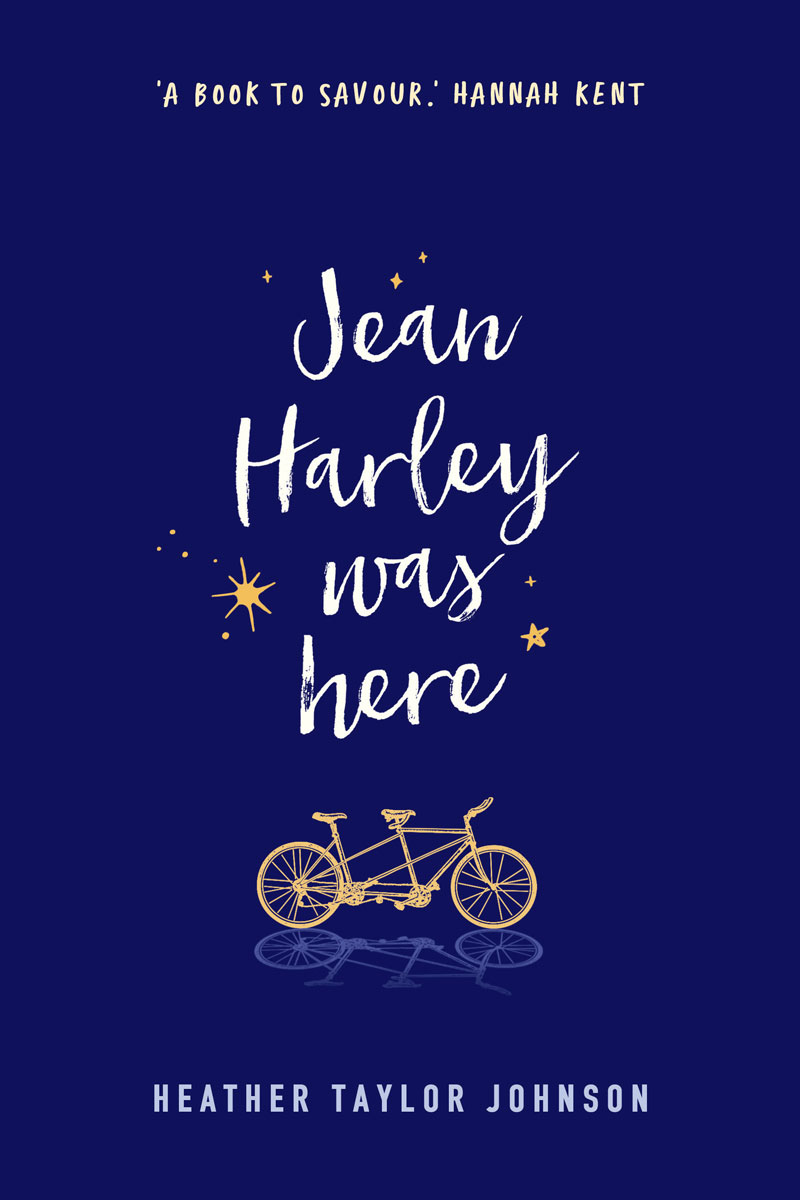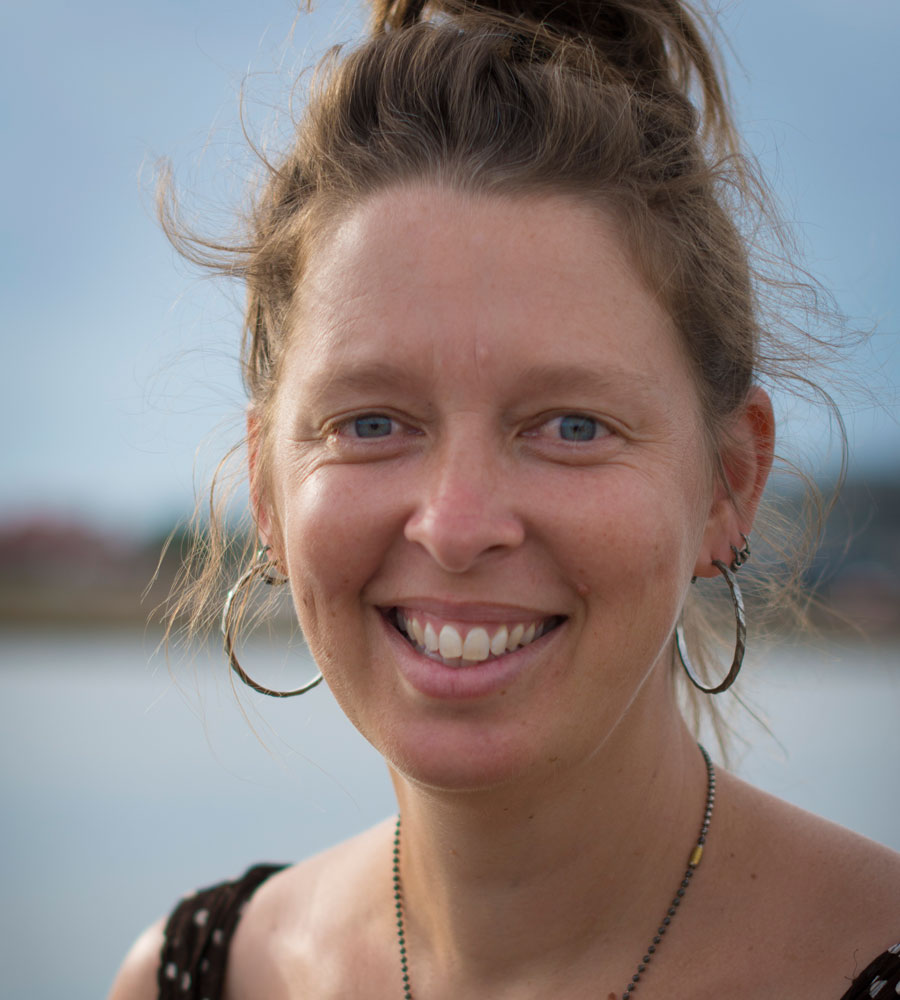Book extract: Jean Harley Was Here
When tragedy strikes, what happens to the lives and relationships of loved ones left behind? That’s the question at the heart of Adelaide writer Heather Taylor Johnson’s new novel, Jean Harley Was Here.

The cover illustration from Jean Harley Was Here.
Title character Jean is a “shining light”, and when she is struck down by an accident those around her – including husband Stan, young son Orion, and her best friends Neddy and Viv – are left floundering. The book also explores the impact on ex-convict Charley, the man “who caused it all”.
Published this month, Jean Harley Was Here is described by publisher UQP as a touching exploration of love and relationships and has earned praise by fellow author Hannah Kent (Burial Rites, The Good People), who writes:
“Heather Taylor Johnson has a poet’s understanding of the world: her exploration of the way in which our lives intertwine – for better and for worse – is nuanced and poignant. A book to savour.”
The following extract is from Chapter 13, narrated by Jean’s brother John.
___________________________
Though they shared a heinous loss that would eventually bring them closer, the rolling sound of the suitcase over the hardwood floor set the men apart: John was a stranger, Stan at home. And so he felt uncomfortable, claiming part of Stan’s space for the next few days. He felt uncomfortable without Jean in the room. He felt uncomfortable wanting to unpack his suitcase right after his sister’s wake. He’d planned on getting settled at the house days before the funeral, but things don’t always go to plan and death doesn’t afford a body time to wait.
He’d gotten the call five nights earlier as the rest of his small town slept. Wide awake with a focused urgency pushing his grief aside, John booked a flight immediately. It was high-priced and lengthy, but his sister was dead.
By morning he and his daughter were more or less packed and ready to go – ‘We’ll buy whatever we forgot’ – and they were off. Problem was there’d been so much snow. In this flat land of all-horizon, John Harley couldn’t have separated the white earth from the white sky if he tried. Ventilated heating worked to warm him inside the cubicle of his car and morning radio worked to cheer him, but that feeling in his gut of being caught between two places and not having a single step of solid ground on which to stand was bearing down on him; nothing had felt right. With his sister gone, with his marriage ending, John wondered if anything would ever feel right again.
 Coraleen had curled herself into an unshapely S on the passenger seat, exhaling the softness of a fifteen-year-old’s breath. John wasn’t in any way glad he was travelling across the world to collect a handful of his sister’s ashes, but he couldn’t help think the opportunity perfect for him and his daughter. Soon he’d be moving out of the house. He’d have to get used to weekend visitations, shared holidays and school breaks. He’d have to watch Coraleen flower into womanhood on prescribed days. Jean’s dying in a foreign country at least gave John and Coral this: the chance to share a specific time and place with one another; the chance to embrace family; the chance to grieve over its loss.
Coraleen had curled herself into an unshapely S on the passenger seat, exhaling the softness of a fifteen-year-old’s breath. John wasn’t in any way glad he was travelling across the world to collect a handful of his sister’s ashes, but he couldn’t help think the opportunity perfect for him and his daughter. Soon he’d be moving out of the house. He’d have to get used to weekend visitations, shared holidays and school breaks. He’d have to watch Coraleen flower into womanhood on prescribed days. Jean’s dying in a foreign country at least gave John and Coral this: the chance to share a specific time and place with one another; the chance to embrace family; the chance to grieve over its loss.
And at the airport, no, nothing was right. The ground flight attendant had told him that snowstorms generally didn’t last for more than a couple of days, but he knew this to be false. He’d lived in the Wheat Belt for eighteen years and he knew how snow could build. How it could fall horizontally from such a strong wind that you didn’t dare push against it. How schools and workplaces and highways and airports closed down. ‘I have to get to my sister’s funeral.’ Could he have made it sound any more dire? He’d already missed saying goodbye to her while she’d been alive and that made him feel a complete failure as a brother. He had to go now.
The storm lasted three days. They spent two nights sleeping among strangers on chairs and on the floor against the walls of Chicago’s O’Hare Airport. The quality of food in cardboard boxes and wrinkly bags ridiculous, the bar and grill airport lounges’ and restaurants’ food dull and lonely. And they’d had to buy new books. They took long walks to stretch their legs and shrug off boredom, went into shops that hadn’t interested them.
‘You think Mom’s OK at home?’ Coraleen squished a U-shaped pillow three times then moved onto another. It was Christmastime. Not the best time to be left alone with your own sad thoughts. ‘I bet she’s lonely. It’s a huge house. I wouldn’t want to stay there alone.’
They’d been avoiding it, the separation, and John knew this was his daughter’s way of bringing it up. He tried to sound a little cheery and nonchalant. ‘She’d be missing you, that’s for sure.’ And he’d known it to be true. John had felt his need for his daughter growing stronger as his marriage had begun its steep slope downwards. It had been on a gentle decline for years but at some point – and neither his wife nor he could determine when, exactly – the grade had changed dramatically. He saw it happening between his wife and his daughter as well: this need. He saw how they lay upon each other watching TV and how sometimes Lynn would take Coraleen’s hand when Coraleen was asking her a simple question, as if Coral was a small child again and everything she said was a wonder. John expressed his love for his daughter differently. It was more distanced and hesitant, but it was no less deep.
‘She’d be missing you too. It’s not like she’s ever lived without you.’ And here the conversation stopped, Coraleen’s eyes challenging him with adolescent insight. John had wondered when she’d gotten so old.
Things were changing rapidly, too fast for John to feel safe, and now, after Jean’s funeral, after digesting the fact that a portion of her body would soon fit into a small urn he’d bring back home, after the eulogy he gave on behalf of the family back in America, after the wake and all of those condolences from absolute strangers, he was exhausted, wanting a shower and a bed.
‘You can have this front room. It’s sort of a study and a guest room.’
John set the suitcase near the tall table where two African figurines were mated for life. He picked up the male. ‘Did you get these on your trip to Sudan?’
‘We did.’ Stan looked as if he wanted to say something, and John was waiting for him to continue, but he didn’t. John had been in love once too, and though he’d fallen out of it with Lynn, he understood that there was too much to say about the people and the streets where Stan and Jean had travelled together. She’d told him about the trip – about all of their trips – in letters, on the phone, during visits home, and John knew there was no way Stan could sum up that Jean had fallen in love with the mothers who carried babies on their backs, that their journey to Sudan was the first time the two of them had ever talked about having children, that she and Stan both agreed they had never felt so foreign before as in Khartoum, though in years to come they would always consider the city ‘theirs’. How could Stan have said any of that?
‘You guys love your travel.’ John set the figurine back on the table, inwardly wincing for not using the past tense when referring to Stan’s life with Jean and knowing that, really, it was still too soon after her death to worry about using the present tense unapologetically.
‘I guess this is our travel room too,’ said Stan. John looked around the room at all the other objects that told a million stories. It was a purple room with refurbished second-hand furniture and yes, relics from all over the world. Instruments, posters and prints, forget-me-nots of carved wood. A black-and-white photo of three sets of footprints in the sand hung above the couch.
‘That folds out to a bed,’ Stan said. ‘I’ll get you some bedding.’
Stan’s footprint was three times larger than Orion’s, who must have been a toddler when the photo was taken; not surprisingly, Jean’s was the most deeply indented.
‘Great room.’ Coraleen leaned against the doorway. ‘Did Aunt Jean paint all these rooms herself?’
‘Most of them. But not Orion’s.’ Coraleen would be sleeping in Orion’s room.
‘That’s a wild room. I love the stripes going all the way around.’ ‘Our friend Viv did that. Did you meet her? Viv?’ There had been so many people at the funeral and the wake, and they were so tired from the long days at the airport and the equally long flight, that neither Coraleen nor her father answered. ‘You probably can’t remember anyone’s name,’ Stan said, looking rather hopeless. ‘Viv was her best friend. Along with Neddy. Neddy’s the woman who held the wake. She’s helpful. Kind.’ He moved his eyes around the room, back and forth and up and down, then seemed to return to this particular moment in time. ‘Anyway. John …’ He pointed at his brother-in-law. ‘Beer?’
‘That’d be great. I’ll just jump in the shower first?’
‘Go for it, mate. I’ll keep the beer cold. Coraleen? You want some water or juice or anything?’
‘No thanks.’ Coraleen looked at her dad when her uncle left the room. ‘Isn’t this weird?’ she asked. ‘Being here?’
John continued looking around the room. ‘She’s everywhere,’ he said. ‘She’s in all these pictures and knickknacks. She’s in each book on the shelf.’
Coral walked over to the bookshelf and picked up something bright green: a novel she’d probably never heard of by an author she most likely didn’t know. ‘I wish I could ask her what her favourite book was. Then I could read it.’
John scanned the large bookcase, wondered which book his sister had read last. When the thought began to take on a shape he wasn’t prepared to follow through, he changed gears. ‘You want to shower first?’
‘Sure,’ she said, turning back towards her dad. ‘I’m tired.’ ‘Me too.’ When Coraleen walked down the hall, the sound of her shoes seemed to rebound off the hardwood floors and echo from the high ceiling. It was a lonely sound, and John immediately missed her. He had a longing to ask her to sleep in the purple room with him, to share the bed with him as she would have done if she were a small child, but there was something wrong about that now since she was fifteen, and what it was, he wasn’t sure. He felt like yelling down the hallway, ‘Hey, Coral! What’s your favourite book?’ but he had closed the door to the purple room before the feeling stood too tall, and across the hall from the bathroom, in Stan and Jean’s king-sized bed, was a five-year-old boy he didn’t want to wake.
_______________________________
 Extracted, with permission, from Jean Harley Was Here, by Heather Taylor Johnson, published this month by UQP. Taylor Johnson has published four volumes of verse and a previous novel, Pursuing Love and Death.
Extracted, with permission, from Jean Harley Was Here, by Heather Taylor Johnson, published this month by UQP. Taylor Johnson has published four volumes of verse and a previous novel, Pursuing Love and Death.




